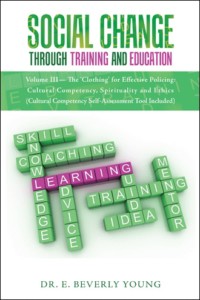Title: Social Change Through Training and Education
Author: Dr. E. Beverly Young
Publisher: AuthorHouse
ISBN: 978-1540661920
Pages: 108
Genre: Social Science / Sociology
Reviewed by: Susan Milam
Pacific Book Review
In her book Social Change Through Training and Education, Dr. E. Beverly Young takes an unusual and somewhat controversial approach to policing: she examines it from a spiritual perspective. Dr. Young asks readers to examine their value systems and to understand how those values affect their approaches to the communities in which they work.
Readers are asked to fill out a self-assessment questionnaire before delving into the book. The questions help people understand the viewpoints they bring to the text. Dr. Young then explains the concept of cultural competency and how it differs from the skills one brings to the job. A culturally competent “person has the knowledge, understanding and skills to embrace diversity.” Dr. Young explains that cultural blindness is not the same as cultural competence; indeed, cultural blindness frequently “anesthetizes a person to the reality” that the needs of one community “may be different than other communities.” Additionally, she discusses the DNA at the core of policing; that discussion is used as a launching point for Dr. Young’s examination of spirituality and ethics, how they differ and how they affect police practice. She goes on to discuss the “cloth” of spirituality and the ways in which it can help people withstand the challenges they face in their vocations.
Dr. Young is a religious woman, and several times she calls upon scripture to undergird her points. However, she emphasizes that getting in touch with one’s spirituality doesn’t require belonging to a specific denomination or being part of a religious community. At no time do Dr. Young’s personal beliefs cause her to judge either her readers or the people with whom she deals with while doing her job. Indeed, she calls upon folks to understand and overcome the stereotypical viewpoints that all people bring to their jobs.
This book is the third volume in Dr. Young’s Social Change series. Although the information may be enhanced by reading the previous two volumes, it can be understood as a standalone book. Dr. Young’s writing style is professional and her assertions are well-documented. She defines her terms, and each section leads logically from one premise to the next. At the end of each unit, there is a page dedicated to describing an “aha moment” elicited by the chapter, and readers are encouraged to use the text as the basis for wide ranging discussions. Despite the seriousness of the subjects Dr. Young tackles, she displays a few moments of gentle humor, as when she states that some “people should avoid working in a customer complaint center or as a hostage negotiator at all cost.”
Social Change Through Training and Education is directed primarily at policing professionals. However, the concepts and strategies discussed will be of value in almost any professional setting, particularly those which deal with diverse communities. Corporate trainers will discover methods for engaging employees and inspiring them to think about the ways in which they approach people at work and in their personal lives. Whether reading the book as part of a workshop or as a personal endeavor, Social Change Through Training and Education will give readers a deeper understanding of how and why they interact with others.


